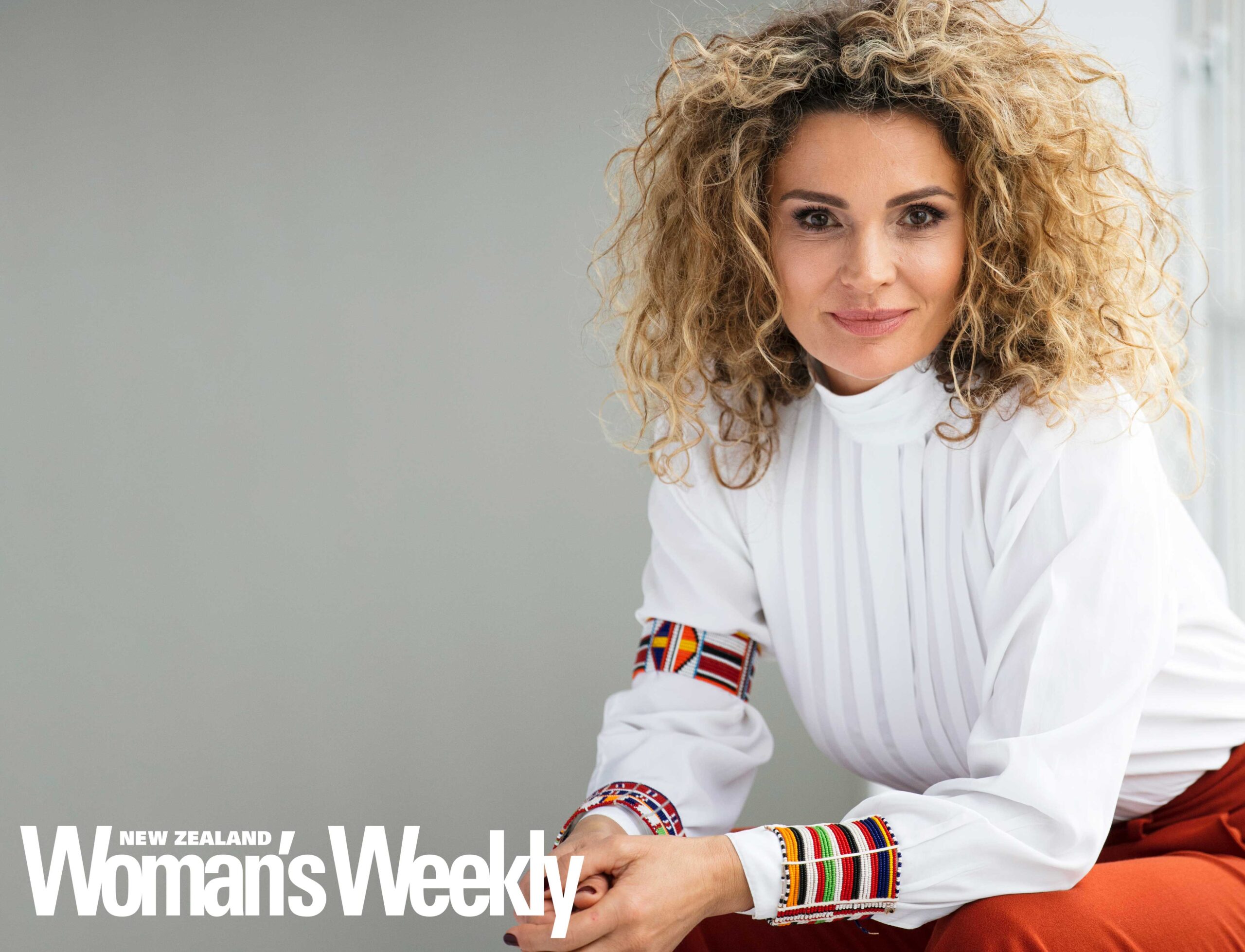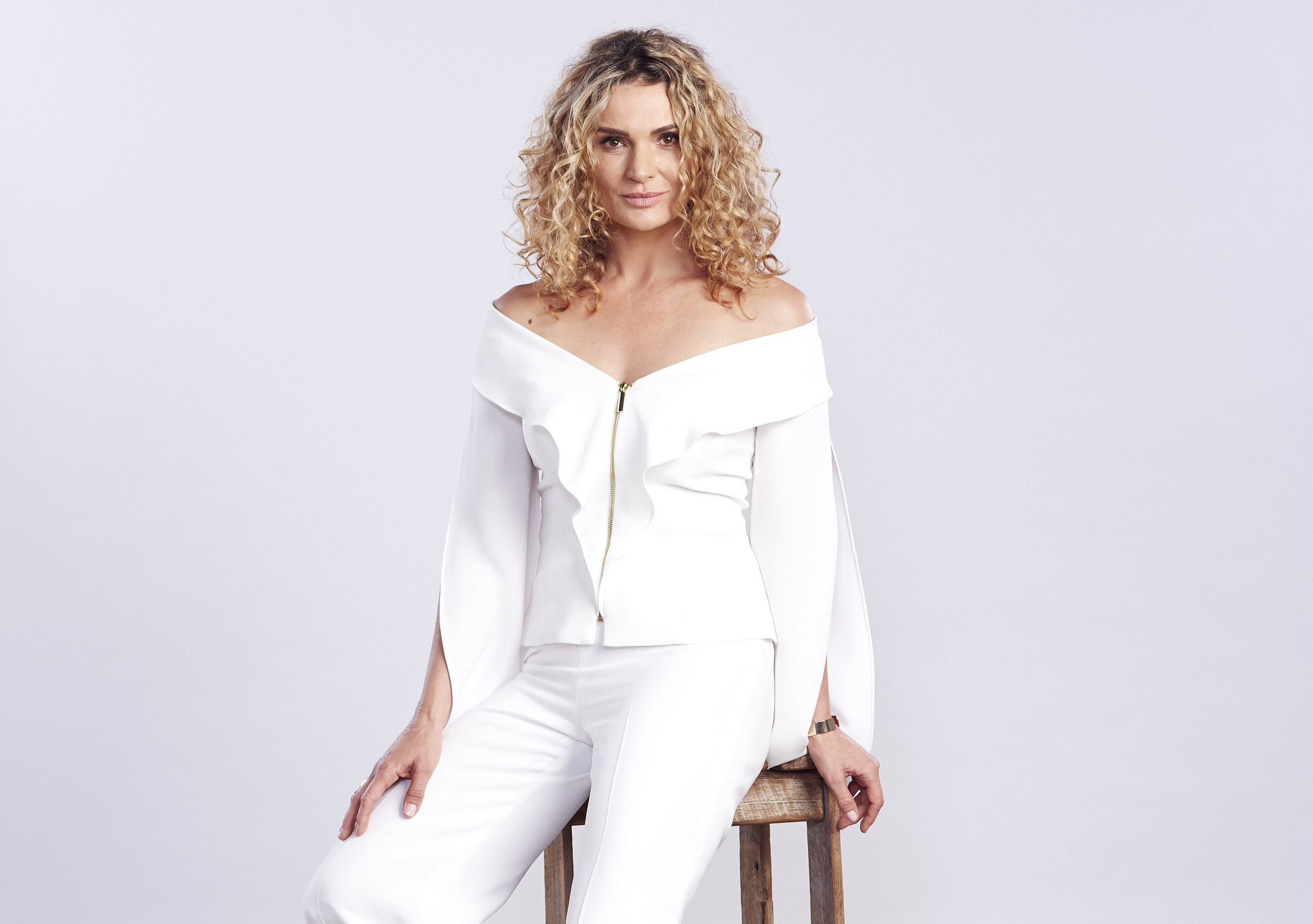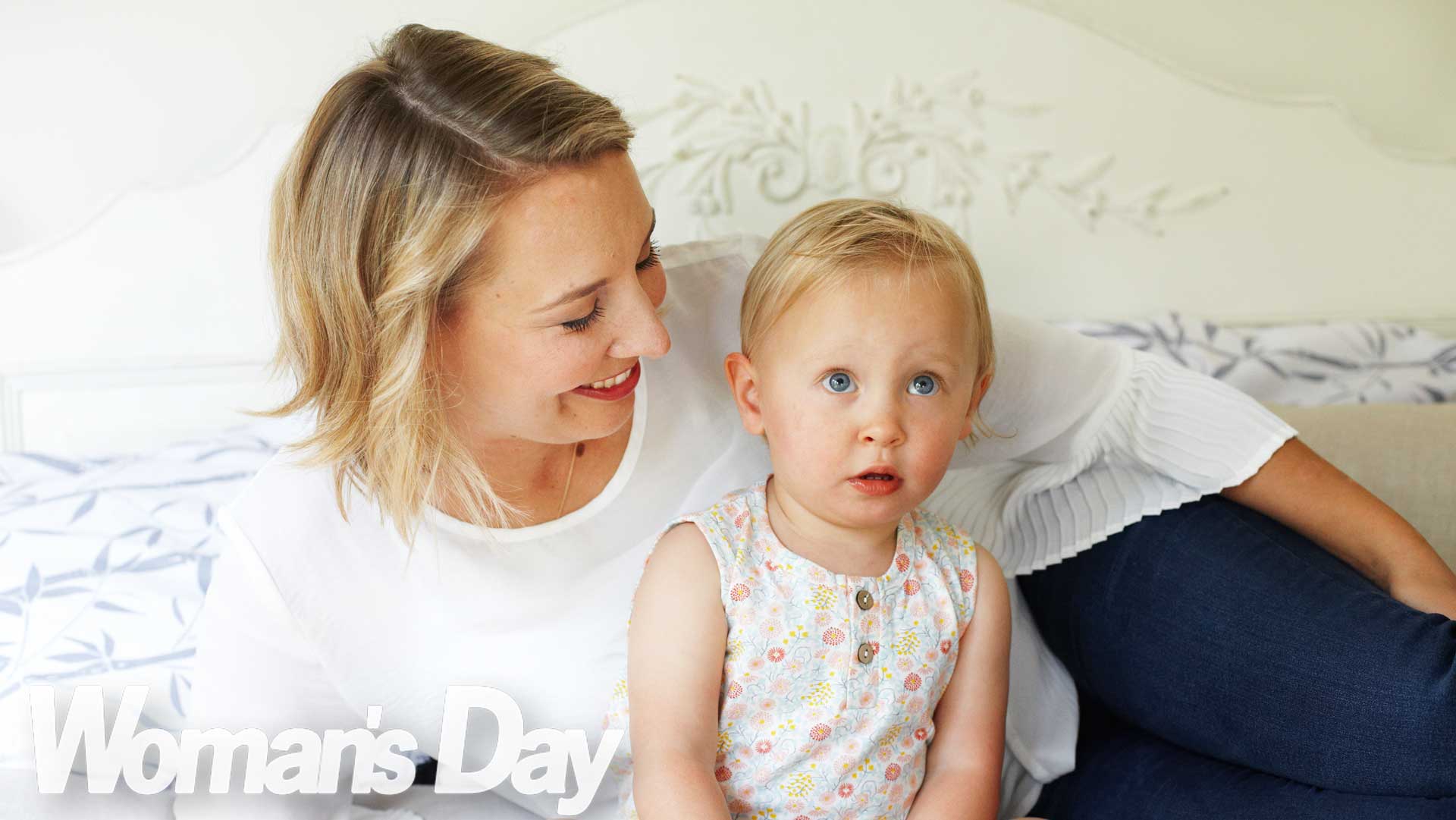Danielle Cormack is used to seeing her name in all sorts of places – on TV show credits, movie posters, theatre hoardings and even engraved into a prestigious best actress Logie award.
But nothing quite compares to the feeling she got when she saw her name on a gold plaque attached to the side of a water tank in Uganda.
The Kiwi actress was in Africa as an ambassador for aid agency ChildFund and to visit a child she sponsors there, when she was invited to a ceremony marking the completion of a huge 100,000 gallon tank built to supply water to 14 villages.
“I had no idea that I was the guest of honour,” she recalls.

Danielle meeting Akulu for the first time.
“I was asked to cut the ribbon, then pull a curtain aside and behind it was this plaque with my name on as a representative of ChildFund. It was an incredibly proud moment, almost on par with giving birth to my children.”
The 10-day trip to Kenya and Uganda has had a huge impact on the former Wentworth star. As well as seeing the projects in action, mum-of-two Danielle (46) fulfilled her long-held wish to meet the child she sponsors in Uganda through ChildFund. Akullu Lona (19) was just six years old when Danielle began contributing money that has gone towards her education and health, and supported her whole community.
“We’ve been writing to each other for 13 years – well, initially, it was her grandfather who corresponded with me on her behalf because she was too young,” explains Danielle.

The actress met other members of Akullu’s family and community.
“I’ve been getting letters from her since she was about nine and I’ve always dreamed of being able to meet her one day. It’s been so fascinating to hear about her life and there has been this beautiful reciprocity with our communication. It definitely wasn’t a one-way road – I feel I’ve got just as much out of it as I hope she has.”
She felt unexpectedly nervous during the drive to Akullu’s home. “I think it was equal parts excitement and anxiety. I’d written to her for 13 years and to finally meet was a big deal for me.”
After an overwhelming welcome from the women of Akullu’s village, who greeted her by waving branches and ululating (doing traditional vocal calls), she spotted Akullu in the crowd and they had an emotional meeting.
“I was incredibly moved and started crying. It was a very joyous moment. I felt like I’d watched her grow up, through her letters, and thenI got to meet this beautiful young woman face-to-face.”

Akullu, who has been raised by her grandparents, gave Danielle a tour of the family’s land and huts, and then they sat together going over Danielle’s letters, which Akullu has kept.
“I had written all about what was going on in my life – it was like reading a diary. Needless to say, there were some interesting photos from the past!”
Danielle has shared details from her career with Akullu over the years, but is not sure if the teenager, who wants to be a nurse, fully grasps what she does for a living.
“Akullu knows I am an actress but I don’t know if she quite understands the work I’ve done. I’ve sent her pictures of me in character but she doesn’t have a television.
“She and her family are far more interested in my family. I’ve had a son, Ahi, since I started writing to her, so she has always asked about him and knows about Ethan because they are closer in age.”

Danielle would love for both her sons – Ethan (21) and Ahi (7) to travel to Africa to meet Akullu, and witness first-hand why she is so passionate about supporting ChildFund. Her partner, film- maker Adam Anthony, went with her on this trip and shot footage to be used by the organisation in its awareness campaigns.
“It was good to have him there to share the experience and debrief at the end of each day. But as we expected, it was tense at times. Thankfully, we have a fantastic working relationship.”
Danielle had been to north Africa before but not the east, where ChildFund does a lot of work helping people whose lives have been devastated by severe droughts.
“It was certainly an eye-opener. I’ve wanted to visit since I started sponsoring a child in Uganda and since becoming a ChildFund ambassador 10 years ago. It was important to see first-hand the work they do and the impact it is having.
“But the planets didn’t align until earlier this year. I was so excited about going, but there was also some apprehension as it was election time in Nairobi, which historically can be quite violent and I was concerned about putting more strain on resources there. The drought is so bad, it has been termed the worst humanitarian disaster since World War II.”

Danielle says it was heartbreaking to see the suffering of people in some of the hardest-hit parts of Kenya, like Turkana, where hundreds of thousands of people are acutely malnourished. Crops have been decimated thanks to drought after drought, and life revolves around trying to find food and water.
“People are really struggling. I walked with one family for 45 minutes along a riverbed that had completely dried up, until they were able to dig down about a metre to find water they could drink. They hadn’t eaten a solid meal in three days.”
In one place, where ChildFund was providing emergency help in the form of Unimix, a kind of nutritious porridge made from maize and bean flour, Danielle helped with feeding the children. “I did also end up going to the local store and buying all the dry biscuits so they would have something else,” she admits.
While it was hard to see people struggling so much, it was heartening to observe how projects set up by ChildFund are making a difference in other areas. Danielle visited health clinics treating children, pregnant women and breastfeeding mothers. She saw how installing bore holes can improve access to water, and also learned about how drought-resilient crops are being planted and irrigation systems improved so food can be grown.

“The thing that attracted me to ChildFund is that unless there is an immediate crisis or emergency, they are not about hand-outs, instead they provide a hand-up, they help people to help themselves. They support and educate communities to become self-sufficient and put sustainable livelihoods in place, which is absolutely vital in the long run.”
Danielle came home with a suitcase full of belts and baskets made by a business venture called Maka Emali, set up by women in a drought-stricken rural part of Kenya and supported by Kiwis to provide extra income. “It’s another example of working with groups to help develop and strengthen their business, which is so encouraging.”
Danielle, who also supports other charities including being patron of and mentor for New Zealand’s Bridge The Gap Project, which helps vulnerable and at-risk young people, hopes to go back to Africa at some stage but for the time being, her schedule is busy with work. In between holding events for Bridge The Gap, she’s been filming a digital series called Patricia Moore, and next year is doing two plays in Australia, where she lives.
“I’m in an adaptation of the Molière play The Misanthrope for Bell Shakespeare [Australia’s national theatre company], playing the lead character who was originally written as a male but is currently being re-written as a female. It couldn’t be more timely with the movement of replacing male with female protagonists and I’m all for flipping gender on its head.
“Then I’m doing an adaptation of Ibsen’s Hedda Gabler for the Queensland Theatre Company, so I am going to be messing with the classics for five months.”
But she will find time to continue to speak out about what’s going on in parts of Africa and campaign for measures that slow down climate change.
“I’ve seen up close the direct effects of climate change – global warming is causing these droughts. I spoke to elders who told me that droughts would come every 10 years, now it’s every two. There is no time to recover and build resilience.
I returned thinking, ‘What else can we do?’ I’m lobbying New Zealand politicians to adopt a zero carbon emissions stance because we have to do something about climate change. We can’t stop it, but we can slow it down.”
The trip made her grateful that her family has access to food, water, education and health services. “Gone are the days of moaning about a cold shower or feeling a little hungry,” she says.

“What I’ve learned from the experience is that a small amount can make a huge difference to people’s lives. These communities are in dire need of the basic essentials in life and doing whatever they can to feed their children. They weren’t standing there with their hands out.
They are extremely grateful for ChildFund NZ support.
“As much as I wish it was possible, you can’t single-handedly stop famines. But you can sponsor a child and make a difference. Or you can buy gifts through ChildFund that are easy and meaningful. Knowing that you changed one person’s life for the better is wonderful, believe me!”

